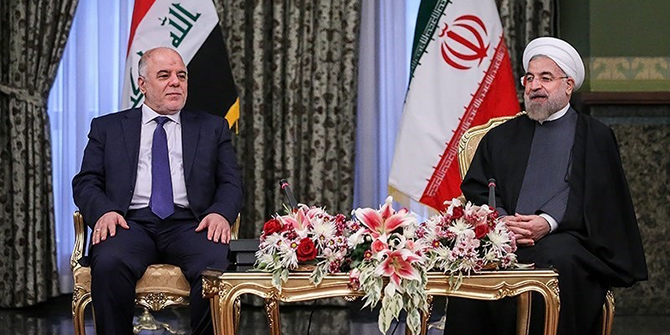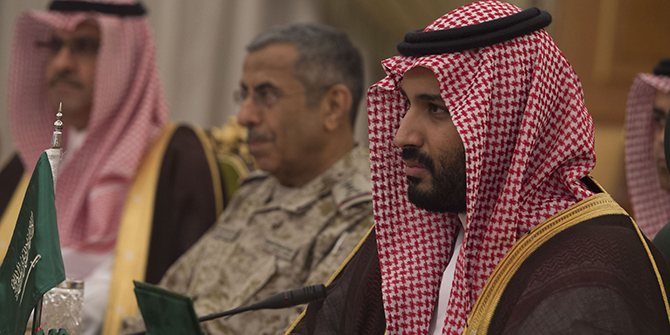by Madawi Al-Rasheed
This article is part of a 4-part series assessing the prospects for new directions in Saudi foreign policy under King Salman and his son.

Muhammad ibn Salman is currently struggling to establish Saudi Arabia as a serious regional power on a par with Turkey, Iran and Israel. Each are currently flexing their muscles in a bid to emerge as the dominant force dictating the outcome of several conflicts in the Arab world. In this heated regional struggle, new alliances are formed and old ones are reversed.
The young Saudi prince has continued the anti-Iranian rhetoric that dates back to the reign of King Abdullah (2005–2015). Unexpectedly, he recently announced that he is determined to bring the fight to the Iranian heartland, a statement tantamount to a declaration of war. Saudi prince and ex-director of the Intelligence Services, Turki al-Faisal, attended two conferences held by the Iranian opposition abroad; notable amongst them were the Mujahideen-e Khalq, an opposition movement ostensibly combining Islam with Marxism. Under King Salman, the proxy war between Saudi Arabia and Iran has continued without resolution in sight. The latest battleground was Yemen in 2015 where Saudi Arabia accused the Iranians of backing the Houthi rebellion.
Saudi’s relations with Iran deteriorated after the American occupation of Iraq in 2003. At the time the Saudis accused the US of removing Saddam Hussein from power only to hand the country to the Iranians. The occupation led to the further expansion of Iranian influence in the Arab world, a threat the Saudis had warned of. Today it is in Iraq where the King and his son are desperately trying to reach out to Iran, the backer of both the Baghdad government and the various militias – most prominently the Popular Mobilisation Forces, or al-Hashd al-Shaabi which it has armed and supported since 2014 to fight IS. Recently, for purely internal reasons, the Iraqi government of Haider al-Abadi has proven more responsive to the new Saudi advances than former Prime Minister Nouri al-Maliki. Three Saudi state visits to Iraq promised to herald a new era of Saudi–Iraqi relations. Foreign minister Adel al Jubeir visited Baghdad on 25 February 2017, followed by Prime Minister al-Abadi arriving in Riyadh in June to meet the King. A meeting with the Iraqi oil minister followed.
However, Saudi Arabia went further by inviting the controversial Shiʿa cleric Muqtada al-Sadr to Riyadh. The Iraqi government welcomed Saudi advances to gain Arab support and undermine any accusations of being motivated by Shiʿa sectarian politics. This was especially urgent after the liberation of Mosul, where a Sunni population has since been struggling to find political space in Iraq in a post-IS era. In the battle of Mosul, word of atrocities committed by official and para-military Shiʿa Iraqi troops and militias spread across the Arab world. Al-Abadi has tried to recast himself as a leader for all Iraqis rather than just the Shiʿa, and good relations with the Saudis could go some way towards improving his image.
On the Saudi side, there is a belated understanding that their previous policy of ostracising Iraq in the post-2003 era has merely intensified the country’s estrangement from its Arab neighbours, precipitating its steady drift toward the Iranian orbit. But without Iran’s approval, Saudi Arabia will find it difficult to ‘reconcile’ with Iraq, especially after several decades of media wars, terrorism blamed on Saudi Arabia, sectarianisation (the politicisation of sectarian identity) and general hostility. Iran’s militias operating on Iraqi soil and the pro-Iranian position of its leading political party, namely Hizb al-Dawa, threaten any genuine future reconciliation between the two countries. Moreover, Riyadh’s erratic foreign policy under Muhammad ibn Salman is a further obstacle to any regional détente between the two estranged neighbours. It is unlikely that Saudi–Iraqi relations will return to any kind of normality before the forthcoming Iraqi elections in 2018. Even if Riyadh seeks genuine cooperation with Baghdad, Iran’s approval will remain crucial for further normalisation, let alone cooperation.
Turkey, considered a close Saudi partner during the Syrian civil war, sided with Qatar in the latest Saudi–Qatari crisis of May 2017 when the small Gulf emirate was put under sanctions by Saudi Arabia, the UAE, Bahrain and Egypt. Turkey is now in the process of strengthening its military presence in Qatar, stationing several thousand soldiers there in preparation for any threat to the small emirate. In an unprecedented move, Saudi Arabia exacerbated the conflict with Qatar when it tried to promote a member of Qatar’s Al-Thani royal family as an alternative emir, thus deepening an already near-intractable rift. This recent episode in inter-Gulf relations has proven to seriously undermine cooperation and unity. More importantly, as with other regional conflicts in the Arab world, regional powers Turkey, Iran and Israel have taken the opportunity to become involved. Israel backed Saudi Arabia and its allies when it announced that it would close Al-Jazeera’s Jerusalem bureau in July 2017.
Muhammad ibn Salman may have scored success with the elephant in the room, Israel – now jokingly dubbed the newest Sunni state – in his bid to form a pan-Islamic and international alliance against both Iran and Qatar. He has continued to clandestinely cooperate with Israel on security and economic matters. In July 2016, a Saudi delegation of academics and businessmen visited Israel with a view to establishing discreet relations, the purpose of which was to strengthen Saudi Arabia’s military capabilities and enlist Israel in any armed confrontation with Iran. Saudi Arabia also has a new geographical and strategic link to Israel after Egypt offered to cede the two Red Sea islands of Sanafir and Tiran to Saudi Arabia. Both islands sit on the Straits of Tiran, Israel’s only access to the Red Sea, and they may in the future serve as launching pads from which to enhance military and security cooperation between Israel and Saudi Arabia. The Saudi public is being prepared for greater cooperation with Israel, especially through Saudi-sponsored media, now much more willing to permit articles that do not overtly criticise the Israeli occupation and its treatment of Palestinians in the West Bank and Gaza. Saudi Arabia has also criticised Qatar for supporting the Palestinian group Hamas, now designated as a terrorist organisation. Muhammad ibn Salman has certainly pleased the Israelis by doing so and assured them of his willingness to foster greater cooperation. However we shouldn’t expect an Israeli flag to be raised in Riyadh soon. This will take some preparation and coordination and the stakes in such a controversial move are high for the young aspiring prince.
 Madawi Al-Rasheed is Visiting Professor at the LSE Middle East Centre. In January 2017, she returned to the MEC from a sabbatical year at the Middle East Institute, the National University of Singapore. Previously, she was Research Fellow at the Open Society Foundation. She tweets at @MadawiDr.
Madawi Al-Rasheed is Visiting Professor at the LSE Middle East Centre. In January 2017, she returned to the MEC from a sabbatical year at the Middle East Institute, the National University of Singapore. Previously, she was Research Fellow at the Open Society Foundation. She tweets at @MadawiDr.







Saudi Arabia is loosing ground rapidly sice King Salman took office. The war in Yemen, oil low prices, supporting terrorists in Syria and Iraq, and buying regional and international governments by US $, in addition to the chronic lack of democratic political structure are taking their toll on Saudi Arabia. Saudi Arabia is no match to Iran, and without the support of the US, Saudi Arabia will collapse tomorrow.